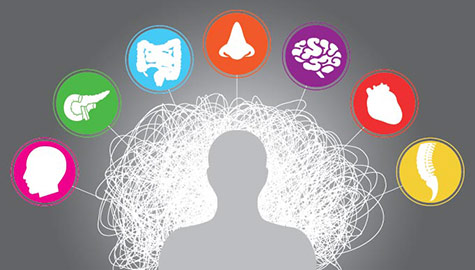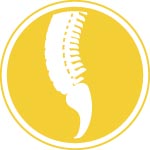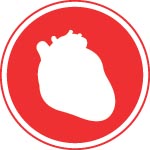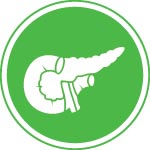
This is the fourth in a series of Record articles looking at stress. To read other parts of the series, visit here.
Gut

Stress is linked to any number of gastrointestinal disorders, from diarrhea to irritable bowel syndrome. That’s why gastroenterologist Gregory Sayuk, MD, assistant professor of medicine and of psychiatry at Washington University School of Medicine in St. Louis, encourages his patients to relax and make time for activities they enjoy.
“Even though I’m a gastroenterologist, I’ve become pretty familiar with effective strategies to treat stress and anxiety because they are inseparable in a lot of individuals,” Sayuk says.
“I can give them all of the bowel-specific medications in the world, but if you don’t address stress, they’re probably never going to be satisfied with anything I give them.”
Back

Chronic stress can cause our muscles to involuntarily contract, leading to pain in our necks, backs and jaws as well as headaches.
“That fight-or-flight response puts us in a defensive mode to the detriment of the muscle tissue,” says Jennifer Miller, a physical therapist in the Program in Physical Therapy at Washington University School of Medicine.
“The long-term consequences can be chronic pain. There is this vicious circle of stress-pain-stress-pain, which can lead to inactivity, which can impact all sorts of social interactions. And from a musculoskeletal aspect, the less we move, the less fit we are.”
Face

Stress can inflame acne and trigger psoriasis and eczema symptoms. Our skin, after all, is our body’s No. 1 immune organ, and when it suffers, so do our complexions.
“When a patient is less stressed, you will often see their condition improve,” says dermatologist Eva Hurst, MD, assistant professor of medicine. “Taking the time to relax to focus on the mind and body is important for a lot of these diseases.”
Heart

Although more research is needed, there is a link between stress and cardiovascular disease, says cardiologist Andy M. Kates, MD, associate professor of medicine. He says studies show that workers who experience high levels of job stress have an increased risk of cardiovascular disease. Some victims of chronic stress compound that risk by smoking, drinking and eating unhealthy foods.
Acute stress, such as the stress we experience when a loved one dies or after a natural disaster such as an earthquake, also can lead to stress-induced cardiomyopathy, a reversible heart condition. It’s rare, but well-documented, Kates says.
“It’s also known as tako-tsubo, a Japanese term for octopus urn,” Kates says. “The heart ends up looking like an octopus and balloons out.”
Kates encourages his at-risk patients to develop healthy coping mechanisms.
“The question is what can be done about it,” says Kates. “The best thing to do is prevention — tobacco cessation, treating high blood pressure, maintaining a healthy weight. But also educating yourself about the effects of anxiety and anger.”
Pancreas

The stress reaction can spike glucose levels and lead to poor eating choices, says
Garry Tobin, MD, associate professor of medicine and director of the Washington University School of Medicine Diabetes Center
at Barnes-Jewish Hospital. And there is some evidence that stress even can lead to diabetes.
“Can stress cause diabetes? The answer is maybe. Can stress lead to changes in your blood sugar? The answer is absolutely,” Tobin says.
Tobin says patients who control their stress tend to do a better job managing their diabetes.
Brain

Stress can prevent the brain from switching offline, making sleep elusive. Kelvin Yamada, MD, director of the Washington University Sleep Medicine Center, says a period of winding down before sleep can help.
“Anytime you activate your brain, whether through stress, exercise or studying, it’s harder to fall asleep at bedtime,” Yamada says.
“Telling someone to relax is easier said than done, but developing good sleep habits and coping mechanisms for stress are better alternatives than medications.”
Yamada adds that college students who work into the night and sleep late develop “delayed sleep phase.” Staring at a bright computer monitor late at night further exacerbates the condition.
“During finals, college students are going to stay up late studying, reinforcing delayed sleep phase,” says Yamada says.
“The problem is some may have a hard time resuming a normal sleep cycle. It makes getting to that 9 a.m. class very difficult.”
Nose

Internist Mark H. Gregory, MD, assistant professor of medicine, says stress-related fatigue makes us more vulnerable to the common cold. He points to a study that shows college students who consistently fail to get a good night’s sleep catch colds more easily than their well-rested counterparts.
“That’s something to think about this time of year when students are under so much stress,” Gregory says. “If you are under physical stress or emotional stress, you don’t have a lot of energy to run your immune system.”
Stress Quiz
Believe it or not, stress was our body’s gift to our early ancestors. The sight of a hungry sabertooth tiger would set off our stress response — a chemical reaction that prepared the body to fight or flee. Today, however, shopping for the holidays, studying for finals and working long hours all can trigger stress. Take our “Stress Test” to see how much you know about this condition and its consequences.
1) Which Mexican treat is loaded with stress-busting potassium?
A) Guacamole
B) Tequila
C) Taco Bell Doritos Locos Tacos
D) Churros
2) What hormone is NOT released during the body’s stress response?
A) Adrenaline
B) Cortisol
C) Arachidonic acid
D) Norepinephrine
3) Those who suffer from chronic stress tend to store excess fat in what part of the body?
A) Ear lobes
B) Abdomen
C) Thighs
D) Wrists and ankles
4) Which mindfulness technique helps individuals manage stress?
A) Meditation
B) Yoga
C) Diaphragmatic breathing
D) All of the above
5) Eating turkey can trigger the production of which stress-relieving neurotransmitter?
A) Glutamate
B) Estrogen
C) Oxytocin
D) Serotonin
6) True or false, smiling reduces stress.
A) True
B) False
7) Which of the following is not linked to stress?
A) Cardiovascular disease
B) Acne
C) Pregnancy
D) Irritable bowel syndrome
8) Which gland releases the stress hormone cortisol?
A) Pancreas
B) Adrenal
C) Pituitary
D) Pineal
9) According to a Sperling’s BestPlaces study, which American city is the most stressed, based on suicide, divorce, crime, joblessness and commuting statistics?
A) Tampa, Fla.
B) St. Louis
C) Newark, N.J.
D) Dallas
10) Recent research from Washington University School of Medicine neuroscientists shows parental nurturing builds which stress-sensitive part of the brain?
A) Hippocampus
B) Occipital lobe
C) Medulla
D) Frontal lobe
Answers
1. A) Guacamole, 2. C) Arachidonic acid, 3. B) Abdomen, 4. D) All of the above, 5. D) Serotonin, 6. A) True, 7. C) Pregnancy, 8. B) Adrenal, 9. A) Tampa, Fla., 10. A) Hippocampus